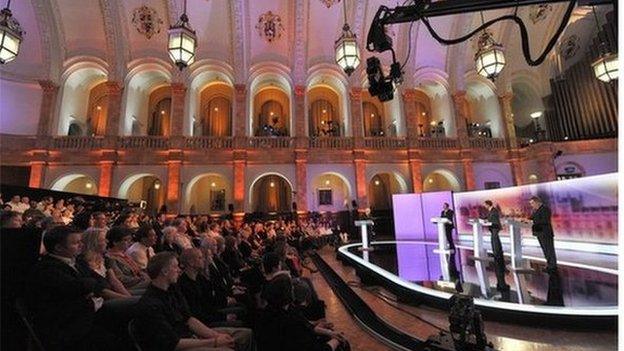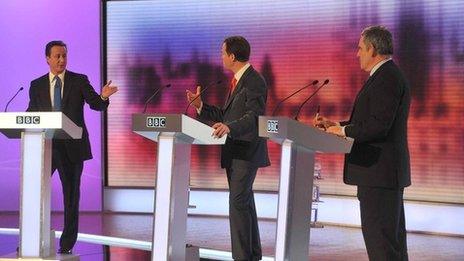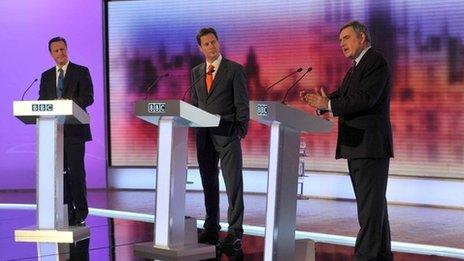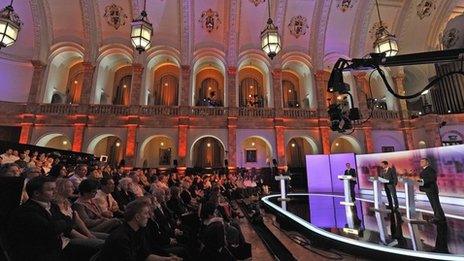Call for 'more diverse' hosts for 2015 election debates
- Published

The three debates in 2010 were moderated by Alastair Stewart, Adam Boulton and David Dimbleby
Broadcasters should consider a more diverse line-up of moderators to host future UK election debates, peers say.
The three leaders' encounters in 2010 had been "disappointingly uniform" in terms of the gender and ethnicity of the anchors, a Lords committee said.
Alastair Stewart, Adam Boulton and David Dimbleby hosted the ITV, Sky News and BBC debates respectively.
While it was up to TV firms to choose, peers expressed "surprise" at the lack of women or ethnic minority presenters.
It is uncertain whether debates between the party leaders similar to those in 2010 will take place next year and, if they do, what format they will take.
Editorial judgement
The Conservatives have said negotiations with the three broadcasters should begin in the autumn and suggested that UKIP and the Greens should be represented in one encounter.
Labour and the Lib Dems have urged David Cameron to agree to take part in a minimum of three debates as a prelude to detailed negotiations.
In its report, external, the Lords Communications Committee said the 2010 debates had been a success and most people expected them to become a standard feature of future general election campaigns.
"We only have a year to go before the next general election and what has been made very clear to us is that most people would be interested in the debates happening again," said Conservative peer Lord Inglewood, who chairs the cross-party committee.
"We hope that this will make it harder for any reluctant party leaders and their strategists to withdraw."
On the issue of moderators, the report said the choice of three white men to host the 2010 debates was "disappointing" although it noted that Krishnan Guru-Murthy had introduced Channel 4's Ask The Chancellors encounter between the parties' economic spokesmen.
'Landing a punch'
Although there was no "concrete solution" to the question of diversity, it urged broadcasters to consider the matter as part of their 2015 deliberations.
"We can conceive of a situation where each broadcaster might recognise the importance of diversity of moderators, but no broadcaster is prepared to put this principle into practice," it said.
"We recognise that the choice of moderator for each debate is a matter of each broadcaster's own editorial judgement.
"Should broadcast election debates take place in 2015 and beyond, we recommend that the broadcasters ensure they exercise that judgement, reflecting our concern, and mindful of the disappointingly uniform outcome of their decisions in 2010."
In response, the head of Sky News, John Ryley, said the broadcaster was "fully committed to making our output reflect the world we live in".
"We believe this will be noticeable in our election coverage," he added.
A BBC representative said it was pleased the report recognised the role played by the debates "in serving the public interest by increasing engagement with the electoral process and perhaps contributing to a higher voter turnout".
Writing in the Daily Telegraph, external, Channel 4 News presenter Cathy Newman said there were many talented female broadcasters "equally capable of landing a punch or teasing out a revelatory answer" as their male counterparts.
- Published29 April 2014

- Published11 February 2014

- Published25 February 2014
